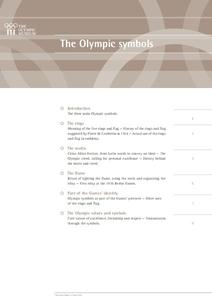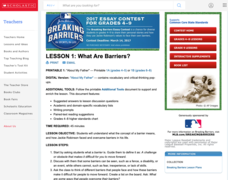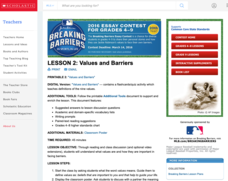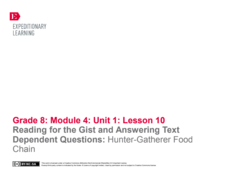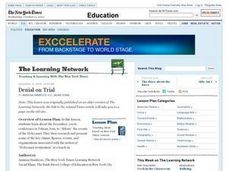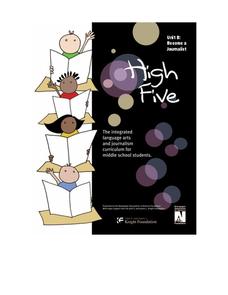Curated OER
Current Event Project
One of the best ways to make history relevant and engaging is to analyze current events before they become history! Check out these project guidelines for a current event research paper, outlining the major required sections of the...
Education.com
Pablo Picasso
Introduce your class to one of the most famous artists of the twentieth century. After reading a brief biography of Pablo Picasso, pupils create their own collages on the next page on the theme of music.
Mr. Roughton
Reformation Dossiers
If you were living during the Reformation and had to choose between arresting Henry VIII, Pope Leo X, or the Grand Inquisitor of the Catholic Church, who would you pick? This engaging assignment will have your young historians critically...
Olympic Museum
The Olympic Symbols
Get into the Olympic spirit with a resource about the values and symbols of the Olympic Games. With sections about prominent images of the Olympics, including the flame and the interlocked rings, the packet supplies engaging information...
NOAA
Thunderstorms, Tornadoes, Lightning. . . Nature's Most Violent Storms
Thunderstorms, tornadoes, floods, and hail are just a few of the topics covered in a thorough weather preparedness guide. With descriptions of each weather phenomenon, from what causes them to how and when they occur to levels of...
Project WET Foundation
The Blue Planet
What a neat interactive that interacts with the amount of water on Earth's surface. It begins with a brief audio introduction of the Blue Planet and how it got its name. Then, users click on the activity to play a game that calculates...
Channel Islands Film
Santa Cruz Island - Writing for Information
After re-viewing a documentary segment on the restoration of Santa Cruz Island,, individuals craft an essay in which they compare the views of the various stake holders featured in the video and identify the point of view they find the...
Channel Islands Film
Island Cattle Ranching
Is cattle ranching on Santa Rosa island viable or non-viable? Rather than focusing on the issues of the transition of Santa Rosa island from a privately owned island cattle ranch to a national park, class members are asked to consider if...
PBS
Myth of the West: Kit Carson to the Rescue
There's nothing like the Wild Wild West! Scholars investigate the American Frontier through the eyes of Kit Carson. To complete the first installment of a three-part series, they use presentations, a short video, and primary and...
Scholastic
Lesson 1: What Are Barriers?
Scholars discuss the concept of a barrier with a short passage on Jackie Robinson. The writing process begins with a paragraph and several other sentences about Robinson's unique traits that made breaking a barrier possible.
Scholastic
Lesson 2: Values and Barriers
Scholars investigate and discuss the importance of values and how they can be used to break barriers. Small groups work collaboratively to examine the text and draw inferences to answer questions. A writing assignment challenges pupils...
EngageNY
Building Background Knowledge: Guided Practice to Learn about the History of Wars in Vietnam
Scholars use a map of Asia to help them better understand the article "The Vietnam Wars," focusing on word meaning in the title and subtitle. Learners then use guided notes while reading the article and discuss their ideas with partners.
EngageNY
Understanding Perspective: Japanese Society’s Impact on Japanese Guards (Pages 189-197)
The focus is on written communication as class members respond to questions about the text Unbroken in their Written Conversation note catchers. They trade note catchers with a partner every two minutes and then share ideas from their...
EngageNY
Reading for the Gist and Answering Text Dependent Questions: Hunter-Gatherer Food Chain
Readers use sticky notes and a close reading guide to identify the gist of "My Pig" on pages 240–245 of The Omnivore's Dilemma. After reviewing their thoughts with peers, they answer text-dependent questions about the section.
Curated OER
Practice Makes Perfect: Citing Textual Evidence
Strategies, lesson plans, and ideas to help pupils locate and cite textual evidence.
Curated OER
Denial on Trial
What is the "Faurisson Affair”? What is “Holocaust Revisionism”? What does freedom of speech entail? Do revisionists have a right to voice their ideas? Such questions are at the heart of a richly detailed, thought provoking lesson...
Curated OER
Justice Is Blind, Colorblind That Is
It's so interesting to see kids respond to articles about education. To start the day, prompt learners to discuss the words colorblindness and diversity. Then, split your class in two and have one side read an article from 2007 and the...
Curated OER
How Often Do You Interact with People of Another Race or Ethnicity?
Is interacting with people from different backgrounds part of a well-rounded education? A big question awaits young readers as they explore two New York Times articles that discuss modern-day segregation, population statistics, and...
Online Publications
Become a Journalist
Explore the newspaper as a unique entity with a detailed and extended unit. The unit requires learners to consider the newspaper's role in democracy, think about ethics, practice writing and interviewing, and examine advertising and news...
Idaho State Department of Education
Lessons for Social Studies Educators
Point of view, purpose, and tone: three concepts readers of primary and secondary source materials must take into account when examining documents. Class members view a PowerPoint presentation and use the SOAPS strategy to identify an...
Scholastic
Prescription Pain Medication: What You Need to Know
The national epidemic of opioid addiction is making its way into high school populations. Educate the students in your class about the ways prescription opioids can both block pain and deliver large amounts of dopamine that make it very...
Curated OER
Strong Convictions
How can the rhetorical structure of an editorial help to develop its argument? Use this New York Times editorial to emphasize the importance of structure in a piece of informational text. Adolescent writers then use the editorial as a...
Virginia Department of Education
Analyzing and Planning Persuasive Writing
Young writers work backward to analyze persuasive techniques. As a class, work through the provided persuasive letter: a plea to an imaginary city council to lift a city-wide ban on fast food restaurants and discount stores. Start by...
George W. Bush Presidential Library and Museum
Teaching Primary and Secondary Sources
What makes a source primary or secondary? Middle schoolers read a definition of each term before exploring different examples and applying their knowledge to a research project.
Other popular searches
- Fact and Opinion
- Prime Factorization
- Multiplication Facts
- Fact Opinion
- Factors
- Fact Families
- Factual
- Greatest Common Factor
- Fact Opinion Lesson Plans
- Math Facts
- Factoring
- Factor Trees





